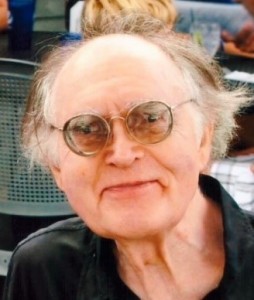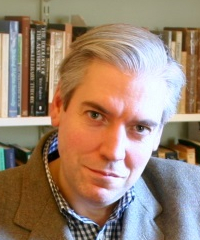 Stewart Goetz is Professor of Philosophy at Ursinus College. We invited him to answer the question “What norms or values define excellent philosophy of religion?” as part of our “Philosophers of Religion on Philosophy of Religion” series.
Stewart Goetz is Professor of Philosophy at Ursinus College. We invited him to answer the question “What norms or values define excellent philosophy of religion?” as part of our “Philosophers of Religion on Philosophy of Religion” series.
One of my mentors once advised me that one cannot do good philosophy of religion without doing good philosophy of mind and action theory. It is in the light of his advice that I address the question “What norms or values define excellent philosophy of religion?” A consideration of kinds of norms informs a consideration of kinds of explanations.
For many, the philosophy of religion is first and foremost concerned with religious belief (as opposed to practice), how it is arrived at, and what norms or values governs this arrival. How belief is arrived at (how believing occurs) concerns its explanation. The philosophy of mind reveals that believing is causally determined, so that one is directly a patient with respect to what one believes. What is involved in this causal determinism? When one infers B by apprehending, say, “If A, then B” and “A,” and one also believes A, the apprehension and belief directly causally determine a belief in B. There is fundamental and irreducible mental-to-mental causation where, given the apprehension and belief, one reasonably (a norm or value) infers belief in the conclusion in the sense that one’s reasoning conforms to a logically valid rule (standard) of inference. Failure to apprehend the rule (e.g., through inattention) typically results in mental-to-mental causation that fails to track the rule. But given apprehension of the rule and belief, one cannot help (because one has no direct control over) believing the conclusion. This mental-to-mental causation in turn results in fundamental and irreducible mental-to-physical causation in the form of the production of events in one’s brain. Thus, when one makes inferences (reasons), one is aware of mental-to mental causation, and this produces mental-to-physical causation.
What do these general points about inferred belief have on the specific issue of religious belief? They raise questions about what is an acceptable explanation of religious belief. The contemporary philosophical naturalistic worldview requires an explanation of religious belief in terms of evolutionary advantage. An acceptable explanation of religious belief must ultimately be a physical-to-physical or physical-to-mental causal explanation. Most generally, naturalists claim that purposeless variations causally produced beliefs of a religious nature (e.g., beliefs in souls, spirits, gods, and/or God) that happened to be advantageous for survival and reproduction. The idea that people might have inferentially arrived at such beliefs is excluded from the outset. Not surprisingly, contemporary naturalists also maintain that religious beliefs are false. If what explains these beliefs is their adaptive character, which is blind to the truth-value (a norm) of the beliefs, their truth, while not impossible, would be nothing more than a fluke or accident.
But if one infers beliefs in non-religious domains, why think people cannot inferentially arrive at their religious beliefs? And what about a belief in naturalism. What explains it? Do its adherents reason their way to it? They believe that they do, because they put forth arguments in support of it. But if consistency (another norm or value) has any place in this discussion, why not think that a belief in naturalism is itself the result of random physical causes that proved to be adaptive in nature? And the truth-value of this belief? If it is true its being so is strictly a matter of luck.
What, now, about the philosophy of religion and action theory? What might the former learn from the latter? Once again, it can learn something about a norm and the nature of explanation. Action contrasts with passion. When one acts one does something. On some occasions, one makes undetermined choices, where making an undetermined choice is an intrinsically active mental event. What explains one’s choice? The reason or purpose for which it is made. One’s choice is fundamentally and irreducibly explained teleologically, not causally, and one chooses well or reasonably (in accordance with a norm) when one chooses for the better of two or more reasons. Though a teleological explanation of a choice is not a causal explanation of it, it is nevertheless mental-to-mental in nature. And like the mental-to-mental causation in making inferences, the mental-to-mental teleology in choosing leads to fundamental and irreducible mental-to-physical causation. For example, if one chooses for a reason to walk to the bus, one’s choice leads to events in one’s brain which ultimately produce movements of one’s legs.
We learn from action theory that there is mental-to-mental teleology, which leads to mental-to-physical causation. What bearing does this point have on religious belief? Religious people often believe that the gods or God chose to act for purposes and thereby produced mental-to-physical causation in what are traditionally termed miracles. Naturalism in principle dismisses miracles. The mental-to-mental and mental-to-physical forms of explanation involved in them are explanatorily ruled out from the beginning. Why? If naturalists occasionally choose to act purposefully and causally affect the course of events in the physical world, why is it in principle impossible for a divine being to choose to act purposefully and causally affect the course of events in the physical world? If the latter is in principle impossible, then consistency would seem to imply that naturalists themselves cannot choose to act purposefully and produce events in our world. Their choices to write and the writing of papers and books for the purpose of defending naturalism must ultimately be purposeless as the effects of blind physical causes.
We have, then, the following: choice/mental-to-mental teleological explanation/reasonable or unreasonable and belief/mental-to-mental causal explanation/reasonable or unreasonable. Given the presence of “reasonable” and “unreasonable” and their implied norms in both lists, one might think that because people can be directly responsible for their choices, they can also be directly responsible for their beliefs. But this would be a mistake, accounted for by the fact that teleologically explained, undetermined choice is an action, while causally explained, determined belief is a passion. Neither religious nor non-religious persons are directly responsible (a normative issue) for what they believe. Any responsibility is at best indirect in nature and a result of choices they make.
“What norms or values define excellent philosophy of religion?” A satisfactory answer relies on thought about topics in the philosophy of mind and action theory, including causation and teleology, passion and action, determinism and indeterminism, and reasonableness and unreasonableness.


